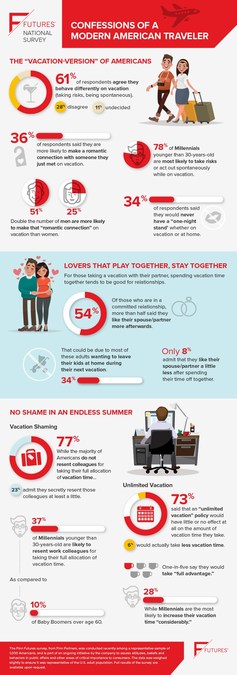
NEW YORK - The "Vacation-Version" of most American travelers is more likely to spend summer days taking risks and acting out spontaneously, while many singles will look for a romantic rendezvous on their summer nights, according to a new Finn Futures survey conducted by Finn Partners' global travel and lifestyle practice.
Sixty one percent of Americans agree that, when on vacation, they make different decisions, take risks, and are more spontaneous compared to everyday life. Meanwhile, 36 percent of single travelers surveyed said they are more likely to make a "romantic connection" with someone they just met if they are on vacation compared to their normal, day-to-day life. Perhaps unsurprisingly, double the number of men (51 percent) are more likely to make that "romantic connection" on vacation than women (25 percent).
And while American travelers are embracing a Summer of Love in 2017, the only "vacation shame" they're likely to receive is if they spend too much time out of the office, with 37 percent of Millennials aged under 30-years-old likely to resent work colleagues for taking their full allocation of vacation time – compared to just 10 percent for Baby Boomers aged over 60.
The findings of the 2017 "Confessions of a Modern Traveler" report reveal opportunities to develop custom tourism products and open new market segments for destinations and their hospitality partners looking to reach underserved traveler profiles.
"Travel is one of the most over-surveyed and highly-scrutinized industries from a business intelligence perspective, but we are only now starting to see more research into the behavioral science behind how travel changes people and what that means for the places they go, the activities they look for, and the ways they act while on vacation," said Gail Moaney, founding managing partner, Travel/Lifestyle Practice, Finn Partners.
"And while it can be tempting to disregard such insight as frivolous, the impact of how travelers fundamentally change who they are while on vacation can be a serious business for the tourism industry that, to capitalize on, will require more collaboration between marketing professionals and the academic researchers conducting groundbreaking studies, like Columbia University's recent report The Dark Side of Going Abroad."
Other key findings of Finn Partners' 2017 "Confessions of a Modern Traveler" report include:
The "Vacation-Version" of Americans
While 61 percent of respondents agree they behave differently on vacation, 28 percent disagree and 12 percent remain undecided.
- The most likely to take risks or act out spontaneously on vacation are Millennials aged under 30-years-old (78 percent)
- Those most likely to indulge in some summer lovin' with a romantic connection are aged between 30-44-years old (46 percent)
- 34 percent of respondents said they would never have a "one-night stand' whether on vacation or at home
Lovers that Play Together, Stay Together
For those taking a vacation with their partner, spending vacation time together tends to be good for relationships.
- Of those who are in a committed relationship, more than half (54 percent) said they like their spouse/partner more afterwards
- That could be due to most of these adults wanting to leave their kids at home during their next vacation (34 percent)
- Only 8% admit that they like their spouse/partner a little less after spending their well-earned time off together